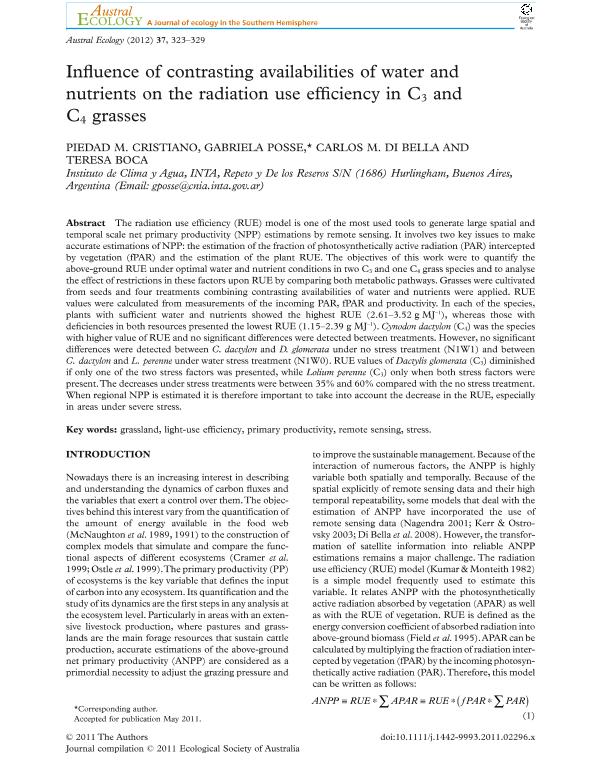Mostrar el registro sencillo del ítem
dc.contributor.author
Cristiano, Piedad María

dc.contributor.author
Posse, Gabriela
dc.contributor.author
Di Bella, Carlos Marcelo

dc.contributor.author
Boca, Teresa
dc.date.available
2023-03-23T11:41:45Z
dc.date.issued
2012-07
dc.identifier.citation
Cristiano, Piedad María; Posse, Gabriela; Di Bella, Carlos Marcelo; Boca, Teresa; Influence of contrasting availabilities of water and nutrients on the radiation use efficiency in C 3 and C 4 grasses; Wiley Blackwell Publishing, Inc; Austral Ecology; 37; 3; 7-2012; 323-329
dc.identifier.issn
1442-9985
dc.identifier.uri
http://hdl.handle.net/11336/191499
dc.description.abstract
The radiation use efficiency (RUE) model is one of the most used tools to generate large spatial and temporal scale net primary productivity (NPP) estimations by remote sensing. It involves two key issues to make accurate estimations of NPP: the estimation of the fraction of photosynthetically active radiation (PAR) intercepted by vegetation (fPAR) and the estimation of the plant RUE. The objectives of this work were to quantify the above-ground RUE under optimal water and nutrient conditions in two C 3 and one C 4 grass species and to analyse the effect of restrictions in these factors upon RUE by comparing both metabolic pathways. Grasses were cultivated from seeds and four treatments combining contrasting availabilities of water and nutrients were applied. RUE values were calculated from measurements of the incoming PAR, fPAR and productivity. In each of the species, plants with sufficient water and nutrients showed the highest RUE (2.61-3.52gMJ -1), whereas those with deficiencies in both resources presented the lowest RUE (1.15-2.39gMJ -1). Cynodon dactylon (C 4) was the species with higher value of RUE and no significant differences were detected between treatments. However, no significant differences were detected between C.dactylon and D.glomerata under no stress treatment (N1W1) and between C.dactylon and L.perenne under water stress treatment (N1W0). RUE values of Dactylis glomerata (C 3) diminished if only one of the two stress factors was presented, while Lolium perenne (C 3) only when both stress factors were present. The decreases under stress treatments were between 35% and 60% compared with the no stress treatment. When regional NPP is estimated it is therefore important to take into account the decrease in the RUE, especially in areas under severe stress.
dc.format
application/pdf
dc.language.iso
eng
dc.publisher
Wiley Blackwell Publishing, Inc

dc.rights
info:eu-repo/semantics/openAccess
dc.rights.uri
https://creativecommons.org/licenses/by-nc-sa/2.5/ar/
dc.subject
GRASSLAND
dc.subject
LIGHT-USE EFFICIENCY
dc.subject
PRIMARY PRODUCTIVITY
dc.subject
REMOTE SENSING
dc.subject
STRESS
dc.subject.classification
Otras Ciencias de la Tierra y relacionadas con el Medio Ambiente

dc.subject.classification
Ciencias de la Tierra y relacionadas con el Medio Ambiente

dc.subject.classification
CIENCIAS NATURALES Y EXACTAS

dc.title
Influence of contrasting availabilities of water and nutrients on the radiation use efficiency in C 3 and C 4 grasses
dc.type
info:eu-repo/semantics/article
dc.type
info:ar-repo/semantics/artículo
dc.type
info:eu-repo/semantics/publishedVersion
dc.date.updated
2023-03-20T14:50:49Z
dc.journal.volume
37
dc.journal.number
3
dc.journal.pagination
323-329
dc.journal.pais
Reino Unido

dc.journal.ciudad
Londres
dc.description.fil
Fil: Cristiano, Piedad María. Instituto Nacional de Tecnología Agropecuaria. Centro Regional Buenos Aires; Argentina. Consejo Nacional de Investigaciones Científicas y Técnicas; Argentina
dc.description.fil
Fil: Posse, Gabriela. Instituto Nacional de Tecnología Agropecuaria. Centro Regional Buenos Aires; Argentina
dc.description.fil
Fil: Di Bella, Carlos Marcelo. Instituto Nacional de Tecnología Agropecuaria. Centro Regional Buenos Aires; Argentina. Consejo Nacional de Investigaciones Científicas y Técnicas; Argentina
dc.description.fil
Fil: Boca, Teresa. Instituto Nacional de Tecnología Agropecuaria. Centro Regional Buenos Aires; Argentina
dc.journal.title
Austral Ecology

dc.relation.alternativeid
info:eu-repo/semantics/altIdentifier/url/https://onlinelibrary.wiley.com/doi/10.1111/j.1442-9993.2011.02296.x
dc.relation.alternativeid
info:eu-repo/semantics/altIdentifier/doi/http://dx.doi.org/10.1111/j.1442-9993.2011.02296.x
Archivos asociados
